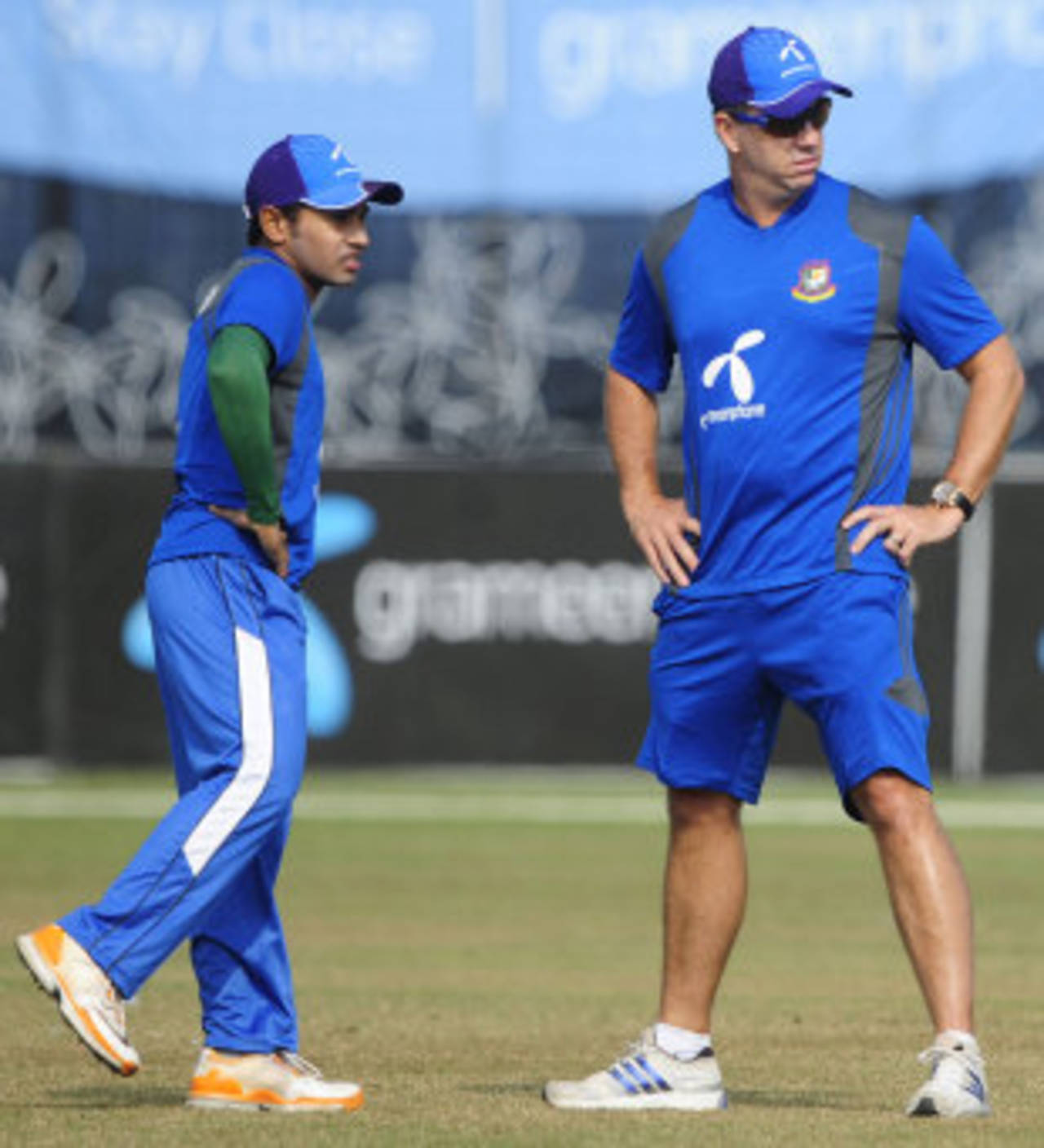Stuart Law's resignation as Bangladesh coach after only nine months in the job is a backward step for the team, which had turned a corner with their performance and outlook during the Asia Cup. His sudden departure will be a critical break in continuity for a team notorious for its unpredictability.
As they have shown in both the micro - after a break for drinks, lunch or tea - and macro - change of coach or captain - Bangladesh's cricketers take time to get back into the groove after a significant event. The start under Law was poor, with losses in Zimbabwe and against West Indies and Pakistan, but Bangladesh hit form in the Asia Cup. Their dedication to the cause and their team spirit was praised by those outside and inside the dressing-room.
Law was blessed, in some ways, with a combination of cricketers who are more talented than any in Bangladesh's history. Shakib Al Hasan and Tamim Iqbal are products of the Siddons-era, but Shakib, despite losing captaincy, has risen to prominence as a world-class allrounder and Tamim has been on the road to recovery over the past two years. Mushfiqur Rahim, who was made captain after Shakib was sacked in mid 2011, has also made his mark as a finisher, and Nasir Hossain made a impressive start in international cricket.
In Law's first Test as coach, former captain Mohammad Ashraful, who was battling for form, struck an important half-century. He was then given an extended run despite falling into his characteristic dip right after that Zimbabwe Test. Ashraful said Law liked to give players confidence without tinkering with how they play. "I have seen him work and he didn't really want us to change techniques," Ashraful told ESPNcricinfo. "He wanted to give players assurance with what they have.
"He was getting to know the players though he didn't get a lot of time to work with everyone properly. Before the Zimbabwe series he only got two days and even later he didn't get much time But he made a difference, as was seen during the Asia Cup."
A nine-month stint is too short to pass judgement on but Law had more success in the same time period than the two previous coaches. Dav Whatmore, who took charge in 2003, only won a single one-day international in his first nine months, while Jamie Siddons oversaw four wins against weaker teams but had poor results against the stronger ones.
However, while Law thrived on bringing a cluster of performing cricketers together to form a core group, the team's biggest stars, Shakib and Tamim, did not have the greatest relationship with him.
In Zimbabwe, there was an alleged spat between Tamim and Law in his first match as coach. After Bangladesh beat India in the Asia Cup, Law wanted to remind the senior players to keep learning. He said: "If you think you've got it, it will come back and bite you in the backside. It's got that wonderful knack of doing that."
On the day he resigned, Law again reminded Bangladesh that they must have everyone performing, and not just one or two players, to move forward. "I am a firm believer that you do have your outstanding performers in the team but they can't be the ones you rely on all the time. At some stage they're going to come up short so that's when the other players should be ready to take the bull by the horns.
"As great a player Shakib is, I didn't want him to be the only player making all the contributions. Shakib and Tamim are the marquee players but the other players have stuck their hand up so that's what you want to see."
Law also saw the darker sides of cricket administration in Bangladesh, when the board suddenly sacked Shakib as captain and took its own time to name a successor, even holding a warm-up tournament to determine whether Mushfiqur Rahim or Mahmudullah was the better choice. There were selection issues before every series with the matter coming to a head when Akram Khan resigned ahead of the Asia Cup. While insisting his departure was for family reasons, Law was gracious enough not to find fault with the BCB.
However, former captain Khaled Mashud said the board must look into the reasons behind Law's departure. "He [Law] has a personal problem, as he has told us, but the board should dig deep. There should be an inquiry so that the next man doesn't have the same problems he had," Mashud said. "His performance was better towards the end of his short tenure but he seemed like a good coach, listened to the players as much as he talked to them. It will be a big loss."
Law's approach to coaching Bangladesh was to take a backseat and not take the lead like Whatmore or Siddons did. With a team containing two stars, a captain and a few more performers, it was important for the coach to let it function on its own. He will always be remembered for sitting in the dugout when Bangladesh took the Asia Cup by storm.
Ashraful was of the opinion that Law's successor should be a high profile coach. "We are still the No. 9 team in the world so there is an effect of what he [a coach] says. The coach also has to be a good motivator."
ESPNcricinfo has learned the BCB is already looking for a new coach and will put out a circular in the next three days with applicants from home and abroad. The likelihood of former Australia batsman Dean Jones, who said he had been contacted by the BCB, getting the job might not be popular with some players after Jones' stint with Chittagong Kings in the Bangladesh Premier League.
Mohammad Isam is senior sports reporter at the Daily Star in Dhaka
